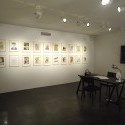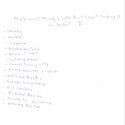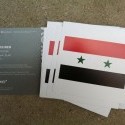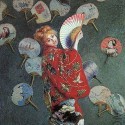PLAYING THE SAME NUMBER
23 September 2012, Cervera de los Montes

I’m chatting with a Cuban curator who lives in the Western Europe.
Riiko: Finally, I don’t do the residency in Mexico City, they cancelled it. They though I was too demanding.
Curator: What did you ask?
R: Basic things like picking me up from the airport, a welcome dinner, scanner and printer for the studio and normal facilities for the show they wanted to organize. Then I wanted them to send my drawings back in an envelope after the exhibition, which seemed to be impossible.
C:Dammit, that’s third world. It’s like a Mexican artists asking Finnish hosts to have sensuality and spontaneity.
R: I don’t have the word “third world” in my vocabulary. It sounds colonialist. I treat all the people the same way, also in my demands.
C: OK, developing country then.
R: I don’t like that word neither. It assumes a desire to develop along the Western capitalist model of economic growth.
C: Do you think the world is the same everywhere?
R: I think the people are very much the same everywhere.
C: The citizens of developing countries are trapped in an abyss of violence and famine and their basic rights are not guaranteed. Developing country is where they can shoot you in the street and you see begging children dying of starvation.
R: We can call them poor countries but I remind you that there's know wealth without poverty.
C: 10% of the world population has the 90% of the wealth – and you and me are part of that 10%. Your discourse seems to be cynic.
R: We can’t eradicate the poverty because without the poor we could not call ourselves rich.
C: We should balance the wealth in the world.
R: One of the cornerstones of the democracy and capitalism is the imbalance. You can’t ask equality in the capitalism. It ain’t no fun if everybody wins in Las Vegas.
C: I think the life of a child is not a game.
R: I go now to play with my kids. Have a good day!
C: You too. You should be more flexible and you could win more in the casino of the art world. Don’t play always the same number!
SHARIA VS SHABIHA
19 September 2012, Cervera de los Montes

I’ve been active in the Finnish media questioning the Syrian uprising and suggesting that the rebels, financed by the fundamentalist dictatorships of the Gulf, don’t fight for democracy and capitalism (our grandiose Western values) but to establish in Syria a dystopian Islamist emirate based on shari’a.
Now it seems that I’ve been taken seriously because I was contacted by a representative of the Syrian National Council, a coalition of Syrian opposition groups based in Istanbul and including organizations like the Muslim Brotherhood.
The anti-government activist told me emotive stories how she was jailed as a teenager. I try to be insensitive towards the heartbreaking propaganda stories of the both sides of the conflict and analyze the panorama coldly.
It's not about who makes you cry but who fights for the co-existence of different people, cultures and religions in the country. It’s not about showing the most horrible photos of the atrocities committed by your enemy but who battles for a secular society. It’s not about the name of the president or the brand of the ruling political parties but peace.
Some of my Syrian friends call me a shabiha, a loosely organized Syrian violent militia supporting the government.
THE INFINITY OF LISTS
15 September 2012, Helsinki

I'm in Finnair's baggage drop line at the Helsinki Airport and my mother is packing in my suitcase a huge smoker to prepare Finnish style fish in Spain, Finnish President brand coffee, a selection of berry juices and O'boy chocolate powder. She says that it's important the kids (I think she refers to both my kids and me) eat and drink Finnish things.
I'm as exhausted as always when I'm leaving this city. Lots of networking. Wild parties. An appearance on the national TV News speaking about my show Syria Study Center and the situation in Syria. Two sauna sessions (one with my mother and another with one of the most powerful curators of the country).
In the inauguration of my show at Korjaamo Galleria, people seemed to like most the Aleppo lists, the ballpoint on paper list drawings the participants of my workshop did last year at the Aleppian Le Pont Organization. If a museum buys them, it means that my Syrian adventure is not over. For the sanctions it's not possible to wire money to Syria and then I have to go to hand the creators of the lists their remuneration.
Few years ago, Umberto Eco said in an interview of Der Spiegel that we have a limit, a very discouraging, humiliating limit: death. That's why we like all the things that we assume have no limits and, therefore, no end. It's a way of escaping thoughts about death. We like lists because we don't want to die
INSHA'ALLAH
09 September 2012, Cervera de los Montes

I'm packing for Helsinki: Bashar al-Assad stickers, a small CD player boombox, two CDs of Syrian patriot music, a mechanical fan, Syrian cardboard boxes, a book of Masahiko Shimada's short stories and warm clothes for the freezing Finnish fall. Syria Study Center will be inaugurated on Thursday at Korjaamo Galleria.
Then I got a message from the gallery. The Finnish Minister of culture Paavo Arhinmäki is interested in my show but he can't make it to the opening reception. Insha'Allah it's true, the presence of a minister would harm my image as a dissident artist. The European Union and the government of Finland have imposed many sanctions on the Syrian Arab Republic, which means that the minister is on my enemy side. I support the government of Syrian in the the fight against the Islamic rebellion in the country. Anyways, the exhibition is not going to be any kind of propaganda. but just a showcase of the plurality of the Syrian civil society.
DON'T KNOW MUCH ABOUT MONET OR IPHONE
05 September 2012, Cervera de los Montes

We the Westerners tend to think that people from the Orient don't know much about history, politics, science, technology or culture. I've heard about a Finnish museum curator who asked a Middle-Eastern artist with an MFA degree if she knew who was Claude Monet.
Last year in Damascus, I befriended with a major of a NATO country army. He was in Syria undercover and crossed the border as a flower business man. He told me that he was researching Salafi terrorism but God only knows what his real mission was. Now he was in Yemen where his interpreter asked about the iPhone he used to record the interviews of the insurgents. My friend explained that it's a smart phone that can be used for sending e-mails and browsing websites. The interpreter said that he just wanted to know was it the iPhone 4 or 4S.




